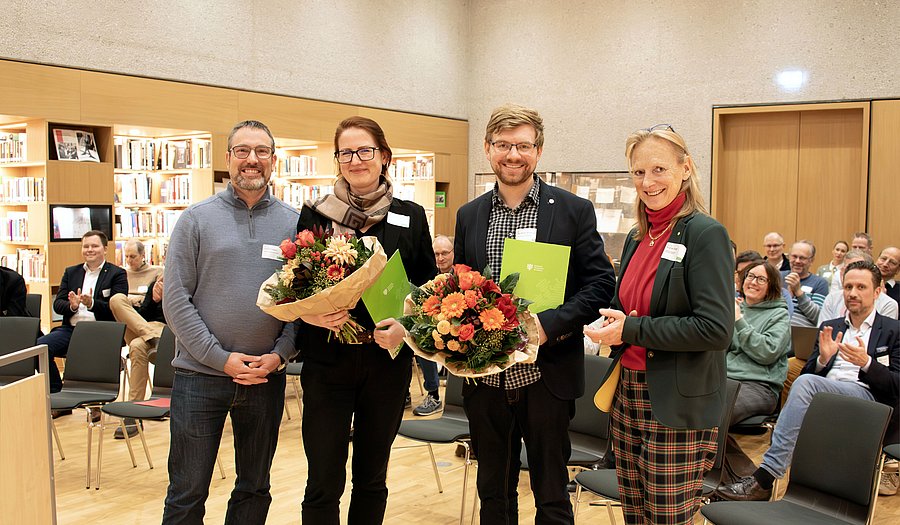Distinction
Bergische Uni awards two publication prizes

University Rector Prof Dr Birgitta Wolff (right) and Vice-Rector Prof Dr Stefan Kirsch (left) congratulated Dr Sophia Victoria Krebs (second from left) and Dr Kai Brinkmann (second from right) on winning the publication award. The third award winner, Dr Pang Wang, was unable to attend the evening event and is therefore not pictured. // Photo Friederike von Heyden
The award winners
In her dissertation project, published by Wallstein Verlag, Sophia Victoria Krebs dedicated herself to researching the German letter from the mid-18th to the mid-19th century. In order to work through the cultural history of the letter, she analysed a wealth of documents from the period on the teaching of letter writing, so-called "letter writers", which contained rules and instructions on how a letter should be written, as well as numerous letters themselves. This enabled her to paint a comprehensive picture of developments in technology, infrastructure, politics, law and education.
The jury recognised her enormously comprehensive and carefully compiled collection of material. In its statement, it said: "Sophia Victoria Krebs succeeds in creating a dense picture of 18th and 19th century society, its constraints, opportunities, relationships and individuals - a picture at the centre of which she has placed letter writing, its practices and materialities."
The prizewinner has found a successful structure and precise language for the presentation of her research, which the reader follows with growing interest and great profit.
Link to the publication
Dr Sophia Victoria Krebs: Reading letters. Semiotics, materiality and praxeology of the German letter from the mid-18th to the mid-19th century
The aim of Dr Kai Brinkmann and Dr Pang Wang is to drive forward future technologies for sustainable energy supply. The two are conducting research at Prof Thomas Riedl's chair into two new types of solar cells, so-called perovskite and organic thin-film solar cells. In just a few years, both perovskite and organic materials have undergone impressive development - with the potential to be integrated into completely new areas of application, from building façades to portable electronics and space applications. Their tunable light absorption, low-cost production, low weight and the ever-increasing efficiency of the solar cells made from them make them one of the most promising classes of materials in photovoltaic research at present. Tandem solar cells are special photovoltaic components in which several solar cells are combined in order to efficiently convert more sunlight into electrical energy, thereby overcoming the fundamental limitations of individual solar cells.
The jury's verdict: "In the field of perovskite-based thin-film tandem solar cells, Kai Brinkmann and Pang Wang, embedded in the team of the Chair of Electronic Devices, contributed very promising and internationally acclaimed contributions of their own, which are prominently discussed in the award-winning review article published in the renowned journal Nature Reviews Materials and have created a lot of momentum in this field of research."
Link to the publication
Dr Kai Brinkmann and Dr Pang Wang: "Perovskite-organic tandem solar cells"
More background on the publication prize
The University of Wuppertal awards two prizes each year for outstanding scientific work published in the previous calendar year.
The prizes are endowed with 6,000 euros each, whereby the awards can be used for research or the publication of research results.
Recommendations and self-applications, including the original publication and a short justification (maximum 1 page), can be submitted to the Vice-Rector for Research and Digital Affairs via referentinfd[at]uni-wuppertal.de until 15 February 2026.
Further information can be found on the "Research" website.
